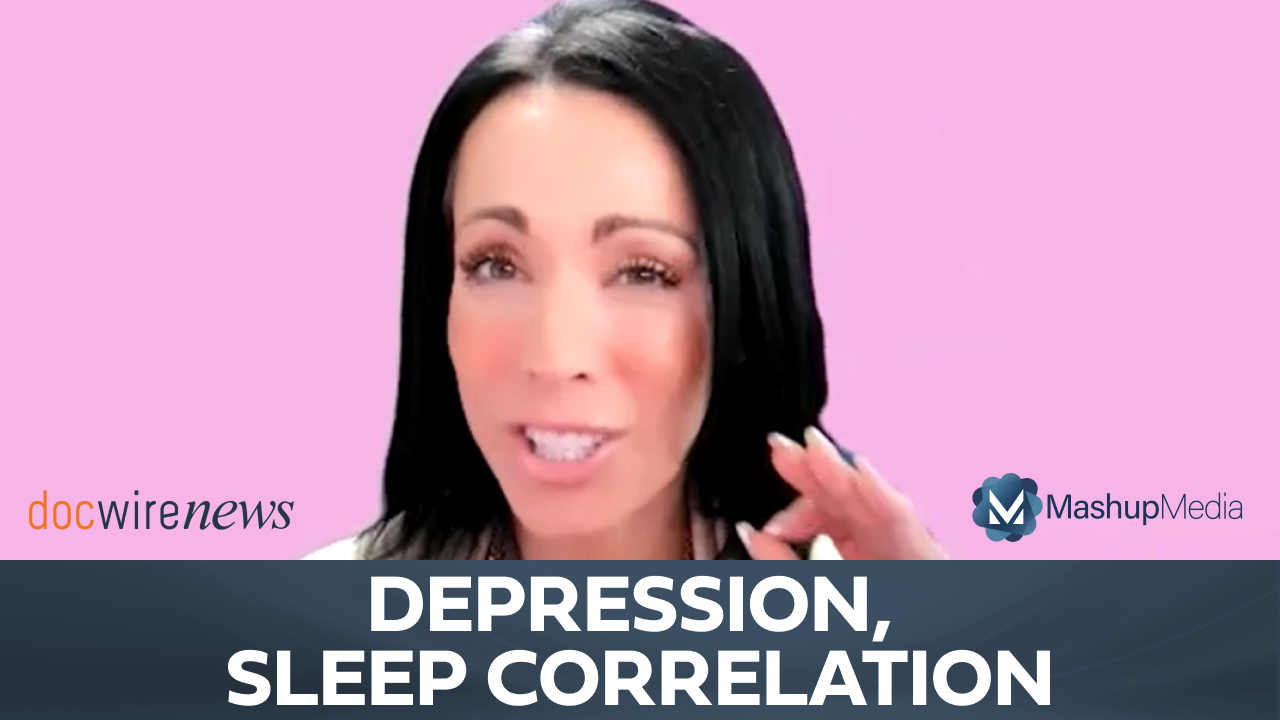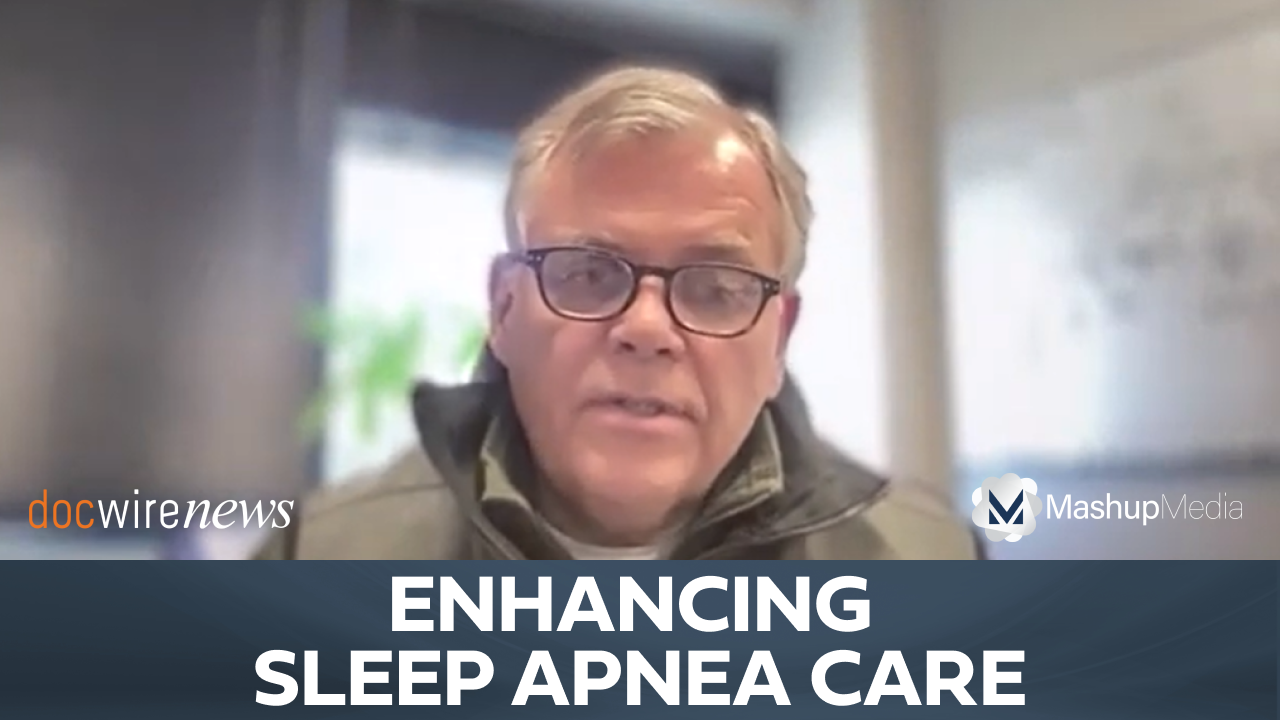Understanding the Link Between Sleep, Dementia
By Anne Marie Morse, DO, Rob Dillard - Last Updated: February 19, 2025It is estimated that more than one third of Americans experience sleep deprivation, which is a growing health concern. Another growing health concern lies in rising cases of dementia, especially Alzheimer disease, which stands as the most common form of dementia. In the US, more than 6 million people are living with Alzheimer disease, and that number is expected to rise to 13 million by 2050. Although previous research has suggested a bidirectional relationship between lack of sleep and dementia risk, the connection is still not well understood. DocWire News spoke with neurologist and sleep expert Dr. Anne Marie Morse to gain a better understanding of this troubling connection, and about the challenges neurologists face in treating patients with sleep disorders.
DocWire News: How does dementia affect sleep patterns?
Dr. Anne Marie Morse: So a hot topic is definitely going to be about neurodegenerative processes and sleep. One of the things that we recognize around sleep/wake health and circadian patterns is that there is what we call a normal ontogeny of sleep. From birth until death, we see an evolution in sleep that is an unadulterated representation of brain health. One of the things we see from the earliest phases is if someone has a neurodevelopmental divergence, we may see changes both clinically and sleep as well as if we were to look at an EEG and see electrographic changes. This is no different when we’re talking about the neurodegenerative processes. Sleep is a critical component of brain health and it also is going to be critical in our ability to help our learning processes. When we think about the learning process occurs in three phases, acquisition, consolidation, retrieval, when we’re having dysfunction in our sleep, it not only is going to compromise on that consolidation piece, but there also are additional biological processes that may be further compromised.
So one of the hot topics that have been being looked at is the relationship between sleep and dementing processes, things like your mild cognitive impairment to Alzheimer’s disease, Parkinson’s disease, you name it. When we look at some of the earlier studies done in something like Alzheimer’s, we see that there was initially this evaluation around obstructive sleep apnea. Individuals who were genetically at risk for development of Alzheimer’s, if they had obstructive sleep apnea and not treated with CPAP, they were found to be more likely to have a rapid progression to the development of features of Alzheimer’s versus those who were being treated and modified to start giving some suggestion, maybe perhaps optimizing sleep was something that was helpful.
A clinical characteristic for Alzheimer’s that gave us another clue that sleep was pretty relevant is that there is a very clear circadian pattern to what their behavioral features look like. They very commonly will have a sundowning type of phenomena where it gets to the early evening hours where maybe we’ll be starting to get ready for bed there tends to be a lot more confusion and even combativeness and aggressive behavior, which very frequently can lead to a lot more difficulty around how do we manage? Do we give them medications that may potentially make them a fall risk? They’re being combative and how do we are able to restrain them or be able to help in modifying that behavior?
Now what we now know is that there are so many interesting sleep/wake and circadian physiologic features that likely are contributing to our brain health and our ability to maybe prevent or even modify these types of processes. First and foremost, we know that there’s a circadian permeability to the blood-brain barrier. Amita Sehgal has done beautiful work down at UPenn demonstrating that there is a time-dependent diurnal distribution to that permeability.
You add and layer in the research around the lymphatic system where we’re looking at how are we removing the waste products from the brain and perhaps that there is a dysfunction in the lymphatic system as well as potentially this permeability. Well, you now have this idea that if I have waste products that need to get removed from the brain and then there also is an increased permeability of the brain for maybe inflammatory factors or things to be able to accumulate more, it does give a nice recipe for you to end up with a lot more garbage or things that need to be removed that aren’t. This is not going to do any favors to the synaptic communications that need to occur in the brain to optimally provide brain performance.
When we’re looking at sleep and dementing processes, it is not a simple answer. It is quite complex because depending on the neurodegenerative process, there are different factors that are contributing. But what I can say, if I want to simplify it, make sure you’re looking at the sleep and circadian patterns in someone you’re concerned about cognitive changes in. This may give you a clue not only about what may be going on, but also an opportunity to intervene in not just a feel-good way of you’re sleeping better, but in a therapeutic strategy to specifically improve the cognitive performance of the individual who you’re caring for.
What are the main challenges faced by neurologists treating dementia patients with sleep disorders?
When looking at the average neurologist who may be taking care of an individual with sleep disorders, a primary challenge that exists is that we’re not well-educated on sleep/wake disorders in general. If I were to look at the general medical school educational experience, it’s somewhere between two to four hours over course of four years of medical school is spent on sleep/wake disorders. This is grossly inadequate when we’re talking about a time that is occupying about 33% of a person’s day. Now, you would think that maybe as we’re moving forward and graduate from medical school and go into residency that we’re going to have an increased exposure in us. Unfortunately, it’s a sad thing to say that when looking at adult neurology residency programs, about 25% of those programs have no sleep/wake educational curriculum, and of the 75% that even have time spent in rotations in sleep medicine, the majority of them are going to be elective rotations, and many of them do not have any faculty at all who are neurologists.
Now, this is not saying that a neurologist is the only sleep medicine specialist that’s going to be able to provide you any type of education or insights on how to best consider and optimize the management of your person who has a neurologic disorder. However, it does introduce who your mentors are and how you’re thinking about the person who’s sitting in the seat in front of you.
And so if I don’t have access in a regular capacity to the education and I don’t have access in a regular capacity to a mentor to remind me to think about the period of time when a person has their eyes closed or are struggling to keep them closed, I am not going to consider that as a tool that I can utilize for my patient. What I’m going to look at is I’m going to look at it as a nuisance of a symptom that my patient is experiencing and I’m going to tell them to see someone else because that is not a problem that I treat, and unfortunately as a neurologist, it is an important reminder to my peers that sleep is a neurologic process. The last I checked it comes from the brain and not the lungs.
However, we partner with all of our specialists who are in sleep medicine because the fact that they equally contribute a tremendous amount to us being able to get a better handle on something that every single human on the face of the earth does, which is sleep, and we need to be able to elevate our practice by making it a standard of care in neurology to really have a consideration of how are we doing any type of basic inventory to better understand the relationship between sleep-wake health and the neurologic disorder?
As I’ve mentioned in the past, when you’re looking at either neurodevelopmental trajectories or neurodegenerative trajectories, sleep is a tool to better get a handle on the appropriate diagnosis as well as optimizing the intervention. Unfortunately, the average neurologist and even potentially the average cognitive neurologist may not necessarily have those tools readily available to them in their tool belt. This is where we have to think as a community of how do we solve for building the right ecosystem and framework so our patients can navigate these courses with a lot less barriers and much better outcomes?







 © 2025 Mashup Media, LLC, a Formedics Property. All Rights Reserved.
© 2025 Mashup Media, LLC, a Formedics Property. All Rights Reserved.